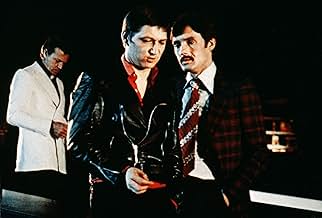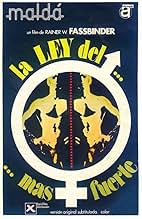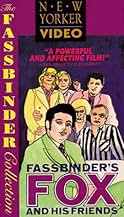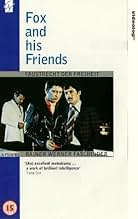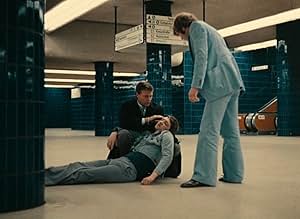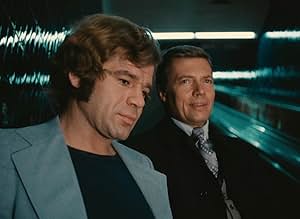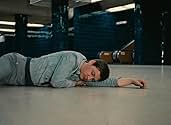AVALIAÇÃO DA IMDb
7,6/10
7,2 mil
SUA AVALIAÇÃO
Um inocente e sugestionável homem da classe trabalhadora ganha na loteria mas se deixa levar por seu novo namorado burguês e seu círculo de amigos materialistas.Um inocente e sugestionável homem da classe trabalhadora ganha na loteria mas se deixa levar por seu novo namorado burguês e seu círculo de amigos materialistas.Um inocente e sugestionável homem da classe trabalhadora ganha na loteria mas se deixa levar por seu novo namorado burguês e seu círculo de amigos materialistas.
- Direção
- Roteiristas
- Artistas
- Prêmios
- 1 vitória no total
Karlheinz Böhm
- Max
- (as Karl-Heinz Böhm)
Harry Baer
- Philip
- (as Harry Bär)
Karl-Heinz Staudenmeyer
- Krapp
- (as Karl Heinz Staudenmeier)
Marquard Bohm
- American Soldier
- (as Marquart Bohm)
- Direção
- Roteiristas
- Elenco e equipe completos
- Produção, bilheteria e muito mais no IMDbPro
Avaliações em destaque
This is the first Fassbinder film I've seen, thanks to Francois Ozon, whose adaptation of Fassbinder's play Water Drops on Burning Rocks turned me on to him. After seeing Fox and His Friends, which stars Fassbinder, I most definitely want more. The story here is familiar - 'loser' gets to win big time and discovers how quickly people are willing - and able - to exploit him. It's the way the piece is written and performed that elevates it above predictability; there is a certain tongue-in-cheek quality to the proceedings that make it thoroughly captivating, through to the bitter end.
The main point of Fox and his Friends seems to be that money corrupts the chances of meaningful human interaction; and the movie has a lot more going for it, there's a deep aesthetic richness, quality of textual reference, and it has the pulse of relationships.
Franz aka Fox is a circus entertainer who wins the lottery and is then fleeced by those whose love he aspires to.
I found myself admiring Fassbinder and Ballhaus' homages to Sternberg, taking the slatted light of Mogador (Morocco - 1930) and pouring colour in, so that the Moroccan street looks like late Bridget Riley. Following on from Welt am draht two years earlier another of Dietrich's iconic moments under Sternberg's gaze is referenced (Dishonored in Welt am draht, Shanghai Express here), pallid mockeries full of weltschmerz (weltschmerz heaped on weltschmerz), a sense that life might be better.
It's quite easy to get carried away with the design, to see the movie as a parade of yellow dresses and peach-coloured flowers. There's a relentless gay aesthetic, for example Eugen, the dandy entrepreneur who grifts fox, has a poster for The Prince of Homburg in his flat, the ambisexual play by high-strung Heinrich von Kleist, whose search for the ideal, seems to govern Eugen's private life. Eugen is an unpleasant man, there's a brilliant shot of him looking through a spyhole, keeping his distance from his waiting lover, coolly observing.
Franz has panic attacks in the movie, a good touch I thought, that's what unrequited love does to you. Aesthetically the best of Fassbinder's movies that I've seen. Gods of the Plague touches it out in terms of successful content.
Franz aka Fox is a circus entertainer who wins the lottery and is then fleeced by those whose love he aspires to.
I found myself admiring Fassbinder and Ballhaus' homages to Sternberg, taking the slatted light of Mogador (Morocco - 1930) and pouring colour in, so that the Moroccan street looks like late Bridget Riley. Following on from Welt am draht two years earlier another of Dietrich's iconic moments under Sternberg's gaze is referenced (Dishonored in Welt am draht, Shanghai Express here), pallid mockeries full of weltschmerz (weltschmerz heaped on weltschmerz), a sense that life might be better.
It's quite easy to get carried away with the design, to see the movie as a parade of yellow dresses and peach-coloured flowers. There's a relentless gay aesthetic, for example Eugen, the dandy entrepreneur who grifts fox, has a poster for The Prince of Homburg in his flat, the ambisexual play by high-strung Heinrich von Kleist, whose search for the ideal, seems to govern Eugen's private life. Eugen is an unpleasant man, there's a brilliant shot of him looking through a spyhole, keeping his distance from his waiting lover, coolly observing.
Franz has panic attacks in the movie, a good touch I thought, that's what unrequited love does to you. Aesthetically the best of Fassbinder's movies that I've seen. Gods of the Plague touches it out in terms of successful content.
The ironically titled Fox and His Friends, Fassbinder's rather excellent study of a none-too-bright circus worker who wins a small fortune in the lottery, is a touching film that features a great performance from Fassbinder himself in the title role. A reflection on the class system and homosexual relationships of 1970's Germany, Fox and His Friends is unsentimental and guileless most of the time. Fox (Fassbinder) is one of the main attractions of a circus like festival, with his lover being arrested for tax fraud. Fox somehow knows he'll win the lottery, so when he picks up a wealthy man at the local 'pick-up toilets', Fox makes sure he reaches the store in time to lodge his ticket. Cut to Fox celebrating his 500 000 marks win, he's drinking in his usual tavern with the effete bar staff and clientele. Fox then somehow becomes involved with a somewhat arrogant and pretentious man, already in a relationship, who takes the naïve Fox for a ride, spending his money in selfish and extravagant ways. Fassbinder's melodrama is droll and poignant, with a tragically ironic ending. Oh, and you have to give extra marks to a director who inserts lengthy nude scenes of themselves in their films.
"Faustrecht der Freiheit" occupies a valued place in my video collection. I find myself returning to it again and again, thoroughly enjoying Fassbinder's talent, which run throughout the film. Perceptive, witty and challenging, this drama provides astute observations on societal motivations, political aspirations and, above all, human nature.
I'm continually blown away with Fassbinder. And it's all the more affecting because, like all great artists, he challenges your conceptions and forces you to have a new experience. We have to fight our way through his movie, critiquing everything we see. Fox is sure he will win the lottery. Today will be the day. And, he does. Like the ending of "Ordet," this is a cliché embraced, but why? Fassbinder is far too intelligent and original a talent to be conventional without a reason. (In fact, in a regular movie Fox's lottery win would be a thrilling set-piece, sitting in front of a TV screen in a living room, with some dying family member in a hospital bed awaiting money for treatment. Here, we don't even see the win.) Of course the lottery win is a set-up for the way money affects a relationship, especially in gay culture.
Basically, Fassbinder is truth. There's a much more honest depiction of factory work here than in, say, von Trier's later films, where he dotes on the "common" man (just as often, woman) as if a simpleton that we should feel sorry for (I doubt they feel sorry for themselves; von Trier just obliges us to feel that way on their behalf). The mistakes made here are by the controllers of the factory -- it's Fox's scheming lover's father who gets the business bankrupt, and it's Fox, after he lends his lover money to get them out of debt, who screws up the printing. But Fox isn't humiliated by his mistake, whereas a blind, helpless Bjork in "Dancer in the Dark" is made to be a pitiable object. (To be fair, both Fassbinder and von Trier have a tendency to wallow in the miserable.)
Fassbinder focuses his film mainly on the class barrier -- Fox's lover makes insulting comments to him regarding proper manners -- but he's also giving us a kind of gay relationship film noir -- we see ex-lovers kissing (in a ceiling mirror!) behind current lovers' backs, and money corruption plays a large part in the film. (Fox's lover is excellent in his role; he never plays a character who's sole purpose for living is to plot in a corner about how he'll be evil today.) And Fassbinder's view of society as something that destroys people is very noirish (Fox isn't completely in the dark; he does understand he's being used as it's happening). But to be sure, Fassbinder is also detailing the upper-class homosexual in a very critical way; but I think he could have done much more exposing the shallowness of gay culture. (He mainly treats Fox's lover and his ex-/secret lover with peeking-through-keyhole disdain, no doubt partly from Fox's perspective, but I find that somewhat childish and not terribly interesting. It's the view of someone who's been screwed over and feels depressed about it, not someone intent on exposing why people are corrupt, and how.) You don't know quite how to feel about this; in a way Fassbinder is very brave -- he casts himself in an incredibly unromantic role. And at the same time it's interesting because, while Fassbinder doesn't seem too pleased with the superficial manner of the gays whose eyes immediately fixate on money and looks, his own film features an abundance of male nudity early on, of young, very attractive boys that Fox himself is quite attracted to.
On a more technical aspect, there are plenty of interesting shots, of reflections, or obscurities, or of the backs of heads or bodies; one particularly stand-out scene is the one where Fox and his lover are vacationing in Morocco and cruise for a man, and when in a taxi with him the camera observes the festival around them while we listen to their discussion. (The man they pick up is Ali from "Fear Eats the Soul," and many of Fassbinder's stable appear in the film. The fact that it's Ali playing a Moroccan -- albeit, one that's ostensibly gay, so it may not in fact be Ali -- gives the film a self-referential bent, though it's never gimmicky; rather, a continuous web of obsessions; there is a comment on racism inputted in this scene, as well.) The ending of the film is a bit too cruel and heavy-handed, though the pessimist in me appreciates it, the part of me that believes society is a pitiless social system out to wreck anything with a pureness of soul. 9/10
Basically, Fassbinder is truth. There's a much more honest depiction of factory work here than in, say, von Trier's later films, where he dotes on the "common" man (just as often, woman) as if a simpleton that we should feel sorry for (I doubt they feel sorry for themselves; von Trier just obliges us to feel that way on their behalf). The mistakes made here are by the controllers of the factory -- it's Fox's scheming lover's father who gets the business bankrupt, and it's Fox, after he lends his lover money to get them out of debt, who screws up the printing. But Fox isn't humiliated by his mistake, whereas a blind, helpless Bjork in "Dancer in the Dark" is made to be a pitiable object. (To be fair, both Fassbinder and von Trier have a tendency to wallow in the miserable.)
Fassbinder focuses his film mainly on the class barrier -- Fox's lover makes insulting comments to him regarding proper manners -- but he's also giving us a kind of gay relationship film noir -- we see ex-lovers kissing (in a ceiling mirror!) behind current lovers' backs, and money corruption plays a large part in the film. (Fox's lover is excellent in his role; he never plays a character who's sole purpose for living is to plot in a corner about how he'll be evil today.) And Fassbinder's view of society as something that destroys people is very noirish (Fox isn't completely in the dark; he does understand he's being used as it's happening). But to be sure, Fassbinder is also detailing the upper-class homosexual in a very critical way; but I think he could have done much more exposing the shallowness of gay culture. (He mainly treats Fox's lover and his ex-/secret lover with peeking-through-keyhole disdain, no doubt partly from Fox's perspective, but I find that somewhat childish and not terribly interesting. It's the view of someone who's been screwed over and feels depressed about it, not someone intent on exposing why people are corrupt, and how.) You don't know quite how to feel about this; in a way Fassbinder is very brave -- he casts himself in an incredibly unromantic role. And at the same time it's interesting because, while Fassbinder doesn't seem too pleased with the superficial manner of the gays whose eyes immediately fixate on money and looks, his own film features an abundance of male nudity early on, of young, very attractive boys that Fox himself is quite attracted to.
On a more technical aspect, there are plenty of interesting shots, of reflections, or obscurities, or of the backs of heads or bodies; one particularly stand-out scene is the one where Fox and his lover are vacationing in Morocco and cruise for a man, and when in a taxi with him the camera observes the festival around them while we listen to their discussion. (The man they pick up is Ali from "Fear Eats the Soul," and many of Fassbinder's stable appear in the film. The fact that it's Ali playing a Moroccan -- albeit, one that's ostensibly gay, so it may not in fact be Ali -- gives the film a self-referential bent, though it's never gimmicky; rather, a continuous web of obsessions; there is a comment on racism inputted in this scene, as well.) The ending of the film is a bit too cruel and heavy-handed, though the pessimist in me appreciates it, the part of me that believes society is a pitiless social system out to wreck anything with a pureness of soul. 9/10
Você sabia?
- CuriosidadesInspired by the films of Douglas Sirk. Sirk had this to say of Fassbinder: "There is a certain kind of artist--the reckless genius. He just shrugs all setbacks off, he is so ultimately convinced that he is bound to succeed. Now Fassbinder has that. I'm not necessarily saying he's a genius--but I personally think he is--but he has that kind of confidence in his own talent. And in Germany, he needs it."
Principais escolhas
Faça login para avaliar e ver a lista de recomendações personalizadas
- How long is Fox and His Friends?Fornecido pela Alexa
Detalhes
- Data de lançamento
- País de origem
- Centrais de atendimento oficiais
- Idiomas
- Também conhecido como
- O Direito do Mais Forte
- Locações de filme
- Djemaa el Fna, Marrakech, Marrocos(restaurant Marrakech)
- Empresas de produção
- Consulte mais créditos da empresa na IMDbPro
Bilheteria
- Orçamento
- DEM 450.000 (estimativa)
- Faturamento bruto nos EUA e Canadá
- US$ 8.144
- Fim de semana de estreia nos EUA e Canadá
- US$ 11.623
- 16 de fev. de 2003
- Faturamento bruto mundial
- US$ 8.158
- Tempo de duração2 horas 4 minutos
- Mixagem de som
- Proporção
- 1.37 : 1
Contribua para esta página
Sugerir uma alteração ou adicionar conteúdo ausente

Principal brecha
By what name was O Direito do Mais Forte é a Liberdade (1975) officially released in Canada in French?
Responda
